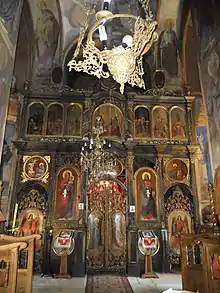Dimitrije Posniković | |
|---|---|
| Born | 1814 |
| Died | 1891 (aged 76–77) |
Dimitrije Posniković (Serbian Cyrillic: Димитрије Посниковић; 1814–1891) was a Serbian iconographer and painter from the 19th century. A student of Dimitrije Avramović, with whom he sometimes collaborated on commissions, Posniković mainly painted icons and frescoes for churches in Serbia.[1]
Biography
Dimitrije Posniković was born in 1814 in Vojvodina, at the time part of the Austrian Empire.[2] At an early age he moved to Belgrade, Principality of Serbia, where he spent most of his artistic career;.[3] There is no record of when and where he was educated. Therefore, his education has not yet been precisely determined. It is known that Posniković was not academically-trained and that he studied painting with Živko Petrović. After moving to Serbia, he collaborated with Dimitrije Avramović, of whom he was considered a disciple,[4] on the creation of wall paintings in the Cathedral Church in Belgrade, which was of great importance for upgrading his visual opus and repeatedly gaining commissions from the Patriarchate in Belgrade. Independently and in collaboration with other acknowledged and leading painters of the 19th-century he painted numerous churches throughout the Principality of Serbia.[5]
Posniković frequently visited the Atelier of Dimitrije Avramović with whom he shared much in common. Milivoje Milija Marković[6] became his assistant on numerous painting assignments commissioned by the Serbian Orthodox Church.
Works

- 1849: iconostasis in the church Saint-Michel de Beljina (listed monument);[7]
- 1851: iconostasis of the wooden church of the Intercession of the Most Holy Theotokos of Donja Jablanica in Jablanica (monument of great importance);[8]
- 1851: iconostasis (attributed) of the church of St. Mark in Užice (monument of special importance);[9]
- 1854: frescoes for the Rača monastery church with assistant Milija Marković.[10][11]
- 1856: frescoes for the church of St. Gabriel in Veliko Gradiste (architectural monument);[12]
- 1870: iconostasis of the Church of St. Nicholas the Wonderworker in Sibnica (architectural monument);[13]
- 1870: iconostasis of the Church of the Nativity of the Mother of God of the Kamenica Monastery (architectural monument);[14]
- 1876: iconostasis and frescoes in the church of Saint Peter and Saint Paul of Kolari (architectural monument);
- 1877: 14 icons for the church of St. Jeremiah in Braničevo (architectural monument);
- 1880s: iconostasis and fresco for the Church of the Ascension in Žabari (architectural monument);
- 1886-1887: frescoes for the church of Saint-Nicolas in Irig (monument of great importance);
- The iconostasis of the church of St. Nicholas in Svilajnac (architectural monument);
- Frescoes of the church of Saint-Michael and Saint-Gabriel of the Klisura monastery (architectural monument)[15]
- Murals for the Church of the Nativity of the Virgin in Velika Moštanica (architectural monument).[16]
See also
References
- ↑ Kolarić, M.; Mohorovičić, A. (1982). Osvit novog doba, XIX vek. Umetnost na tlu Jugoslavije (in Croatian). Jugoslavija. Retrieved 2022-10-19.
- ↑ Savet akademija nauka SFRJ. (1969). Bulletin Scientifique: Sciences humaines (in French). Le Conseil. Retrieved 2022-10-19.
- ↑ Kusovac, N.; Krstić, Đ. (2001). Slikar Đorđe Krstić 1851 - 1907: Narodni Muzej Beograd, 10. Maja 2001 -. Monografija (Narodni muzej--Beograd) (in Serbian). Narodni muzej. ISBN 978-86-7269-049-1. Retrieved 2022-10-19.
- ↑ Avramović, D.; Gvozdenović, N.; Vasić, P.; Muzej grada Beograda (1970). Dimitrije Avramović. Galerija SANU (in French). Srpska akademija nauka i umetnosti. Retrieved 2022-10-19.
- ↑ Kostić, Ana (26 March 2013). "Iconostasis of Dimitrija Posniković in the Church of the Holy prophet Elijah in Mihajlovac" (PDF). Museum in Smederevo (in Serbian).
- ↑ Medieval monasteries of Serbia. Pravoslavna reč. 1998. ISBN 9788676393701.
- ↑ "KULTURNA DOBRA BEOGRADA". Zavod za zaštitu spomenika kulture grada Beograda (in Serbian). Retrieved 2022-10-19.
- ↑ "Споменици културе у Србији". Споменици културе у Србији (in Serbian). Retrieved 2022-10-19.
- ↑ Bošković, Đ. (1953). Arheološki spomenici i nalazišta u Srbiji: Zapadna Srbija. Arheološki institut (in Croatian). Naučna Knjiga. Retrieved 2022-10-19.
- ↑ Hannover, B.G. (2009). Serbien: unterwegs zu verborgenen Klöstern und Kunstschätzen. Trescher-Reihe Reisen (in German). Trescher. p. 331. ISBN 978-3-89794-144-1. Retrieved 2022-10-19.
- ↑ Mileusnić, S. (1998). Medieval monasteries of Serbia. Biblioteka Monografije. Pravoslavna reč. p. 179. ISBN 978-86-7639-370-1. Retrieved 2022-10-19.
- ↑ Janićijević, J.; Tošić, A. (1998). The Cultural Treasury of Serbia. IDEA. ISBN 978-86-7547-039-7. Retrieved 2022-10-19.
- ↑ "KULTURNA DOBRA BEOGRADA". Zavod za zaštitu spomenika kulture grada Beograda (in Serbian).
- ↑ "Манастир Каменац". Епархија жичка (in Serbian). 2013-04-20. Retrieved 2022-10-19.
- ↑ "Klisura Monastery -". 29 September 2015.
- ↑ "KULTURNA DOBRA BEOGRADA". Завод за заштиту споменика културе града Београда (in Serbian). Retrieved 2022-10-19.